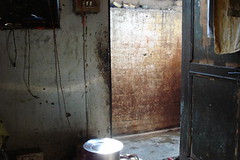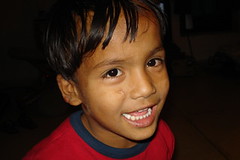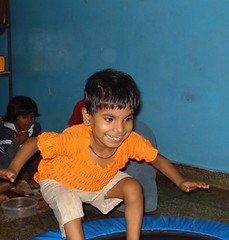by Anuradha Bakshi | May 7, 2007 | Uncategorized
This morning a neighbour of Mehajabi came by. Actually he was the man who had first brought her to us. He had come to collect the precious receipts that would ensure that the child was operated. After collecting the two pieces of paper and listening to the instructions, he lingered on for a while, hesitant to say what he wanted to.
I asked him what the mater was and he said shoved some medical papers in my hand and mumbled some inaudible words. This is his story..
Two years ago he lived in a village in Bihar where he eked a living as a daily wage labourer. He has a tiny plot of land and a little house. Life would have carried on were it not for his wife’s sudden loss of hearing. Local medical facilities being non-existent, he decided to come to Delhi in the hope of getting his wife cured. In Delhi he rented a tiny hovel and started his life as a daily wage labourer in earnest. He also set out get his wife treated but soon discovered that each day spent at the government hospital was one without work and the treatment was taking forever as he was sent from pillar to post.
After some time the comings and goings got the better of the little family as there were four children that needed to be carted each time and the loss of income was too much to bear. The wife too took on a job and life went on. But the ear ailment worsened. The wife’s employer decided to ‘help’ and sent the wife to a local specialist. She paid part of the treatment but then left for another city. The wife was ‘operated’ upon and given a huge prescription of expensive medicines. Part of the doctor’s bill still needed to be paid and the man borrowed and paid the same. But no money was left for the medication and the wife never went back to the doctor.
This was two weeks ago, and the man was at his wit’s end as infection had set in, the landlord not been paid and the family in danger of being homeless. He had come to ask for help.
A quick glance at the medical papers he carried showed that they did not even state what kind of surgery had been performed. We took him to our local doctor who referred him to a ENT specialist and we will try and ensure that she gets treated.
There must be many like this family who come to the city and get caught in an infernal spiral. They leave their roots and home to seek better medical help but soon find themselves worse they were in a inhospitable big city that is ready to devour them. As they try to survive, they sink deeper into debt. Some turn to alcohol, others gamble, and still others take their frustration out on their helpless families.
Welcome to the world of medical tourism of another kind.

by Anuradha Bakshi | May 3, 2007 | two indias
 This morning I went to Mehajabi’s home. I had thought that seven years had inured be to most things but I was in for a surprise.
This morning I went to Mehajabi’s home. I had thought that seven years had inured be to most things but I was in for a surprise.
I must confess that I have been haunted by Mehajabi’s mom’s face since the time I laid eyes on her and I decided to accompany Rani on as she set out for her customary visit to the home of any child that needs heart surgery. This is to ensure that the child will have proper care after the delicate surgery.
Mehajabi lives in a remote enclave behind the Jamia Milia University. We left our three wheeler on the main road that runs along the river and set out on foot through a maze of lanes guided by her gentle father. Though the lanes seemed clean, we were soon hit by swarms of flies. After a long walk we reached a tiny lane where a set of rooms stood in a row, Mehajabi’s
was the last one in the row. It was a tiny room where we were greeted by Mehajabi’s and her mother. Her brother played on the floor. A bed was the only piece of furniture. Clothes hung on a string attached to the wall and all the other belongings lay around.
We soon discovered that eleven persons lived in that tiny room. Mejabi’s grandparents, parents, two aunts and her 4 siblings. As we sat on the bed Rani nudged my elbow pointing at the door. It took me a few seconds to realise what she was showing me. The door opened on the wall that was a dirty orange colour that was the result of years of spitting pan (betel leaf). It was what this young woman had to stare at day after day as she went about doing her daily chores!
It was her room with a view.
Thankfully we were distracted by a chirping sound and looked down to see 8 to 10 chicks, some brightly coloured in pinks and greens. Mehajabi’s mom told us that she had got them for the children to play with as she could not afford toys. What hit me was that there was no anger, no resentment no bitterness; it was their life and they lived it in the best way they could. The young couple had shifted to the parents home when the little girl’s illness was detected as from that moment on all that mattered was her well being. The whole family had come together to ward off the crisis.
I was overwhelmed with a multitude of thoughts that sought answers I did not have. I felt anger, sadness and total helplessness and yet I also felt humbled by the courage and dignity I saw. After a few minutes we got up to leave but were asked to stay on. I had forgotten that this was India, a land where guests are always welcome and honoured. After a few minutes Mehajabi’s father came back with a bottle of Pepsi and two plastic cups. As I held on to my cup, I realised that what I had been offered was steeped in emotions I cannot describe, and was far more than a simple fizzy drink. I drank my cup to the last drop as that was the only befitting thing to do.
By that time little Mehajabi had adopted me and was busy playing with my face. She had walked into my heart just as her mother had. We left in silence humbled and moved by that experience. As we reached the three wheeler were Hare Ram our driver waited, I saw some whispering between the father and son-in-law. The young man was sent to the corner juice man and a glass of juice was brought for Hare Ram, who was also a guest.
After all this was India, the real one that many have forgotten.
click here to see mehajabi’s room with a view
by Anuradha Bakshi | May 3, 2007 | planet why, sealing, sustainability
How to sustain project why is a question that has been haunting me for some time now, I guess time waits for no one and the writing is on the wall! It is a question many have raised, some gently others even brutally. I must confess that I spend many hours thinking about valid options and reviewing past mistakes.
The list of ideas that did not work is daunting: we made candles, jewels, painted T shirts, pots and more of the same and sold them at charity bazaars. We gathered pongamia seeds from he numerous trees around, milled oil and made soaps; we made eco-friendly shopping bags; we even made chocolates but soon saw that none of these could ever bring us the funds required to run pwhy.
And as each idea failed, lessons were learnt. It became clear that we could not match the competition. Moreover the complex legislations related to some products like soaps and food items were wrought with red tape. And finally marketing any product required huge investment. The final blow was the sealing laws that put an end to any small business idea we may have had.
We had to find a minimum or no investment and high return option. That is when I stumbled upon the idea of the one -rupee-a day option. It seemed such a doable one as one thought that it would not be difficult to convince people to part with such a tiny sum. One become bold enough to believe that even the community would part with that tiny amount. But reality struck soon enough as one laboured on. People did not come forward. Or those who did, just did it once and forgot. And yet like you hold on to a special child, this option never left me though it did not bring the desired result.
Slowly planet why came to seed. And yet it again looked doable provided one found the funds to set it up. Many have warmed up to the idea but the investment is huge.
As I write these words I am reminded of the lyrics of a Neil Diamond song:
I’ve looked at life from both sides now
From win and lose and still somehow
It’s life’s illusions I recall.
I really don’t know life at all.
Somehow the sustainability options of planet why are two sides of a spectrum: either we find a huge number of people and ask them to part with a tiny amout of money over a long period of time, or we find a huge amout of money and create our own way of finding money.
Tht is the dilemena one faces!

by Anuradha Bakshi | May 2, 2007 | utpal

Utpal came home for a few hours on Sunday. It was the last Sunday of the month and normally one should have made the trip to his school and shared his lunch of beans and rice but the extreme heat made me change plans and have him come over instead.
We spent the morning preparing his favourite food and bought all the goodies he likes and is not allowed in school: the fizzy drinks, the spicy chips as well as a lot of fruit. Some of his toys were brought down from the attic and the cooler was switched on. The excitement was palpable as we all waited for him.
he came by at 1pm and at first stood shyly but moments later he was his adorable self and reclaimed his proprietary rights. He opened the fridge and took out some oranges. Son the house come alive with his laughter and endless prattle. All his extended family was there and he played to the gallery ensuring that no one felt left out.
The day flew by and soon it was time to leave. His face did fall a little and my heart missed several beats as it does each time I have to let my popples go. The proverbial coward, my pace slacked a little as he started to leave the house. He looked at me with his huge melting eyes and said : bahar tak too ajaho ( at least come till the gate).
I did sheepishly and with moist eyes…

by Anuradha Bakshi | May 2, 2007 | Uncategorized

Sapna, a real dream come true..
She come to us almost five years ago and f you drop by this page, this is part of what you will read:
She is four, has delayed milestones, as she cannot walk or talk. She came to us about two months ago. Listening to her story left us all stunned beyond words. Sapna’s father does not work. He is supposedly unwell, but spends his time gambling and abusing his wife. Sapna’s grandmother has a small tea stall, and Sapna’s mom, Bimla, spends her day washing the dirty utensils. At the end of the day, she gets some food, not always enough to feed Sapna and her small brother, let alone herself! We soon discovered that much of Sapna’s delayed milestones were due to malnutrition and neglect. Sapna joined the early education programme, and with the help of Gaelle, our physio-therapist volunteer, she has slowly started catching up.
Since Sapna has learnt to walk, talk a little, make friends, play, interact and much more. And though we know that she will never lead a normal life, each achievement of hers is cause for celebration.
Imagine my surprise when while downloading the day’s pictures to my camera I found this one. sapna having a whale of a time on the trampoline. To many it may seem innocuous as any 10 year old should be able to jump on a trampoline. But in sapna’s case it is nothing short of a miracle..
I do not even want to begin to imagine what her life would have been had she not come to phwy – thanks to utpal’s mom – . Sapna has never been liked by her father or her grandmother for whom sh is an impediment. Her mom does love her as mom’s do but can do scant else. In a land where social support is nonexistent her life seems doomed as she grows into a young woman.
It is for the likes of Sapna that planet why becomes imperative as it would giver her a fulfilling life tailored to her needs. That is why I know it will happen one day..






